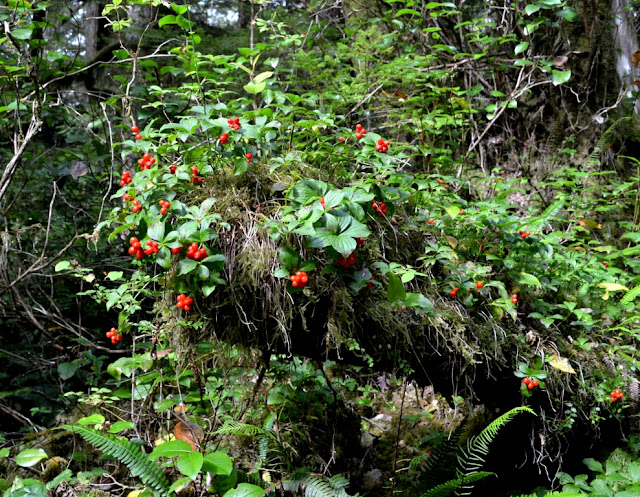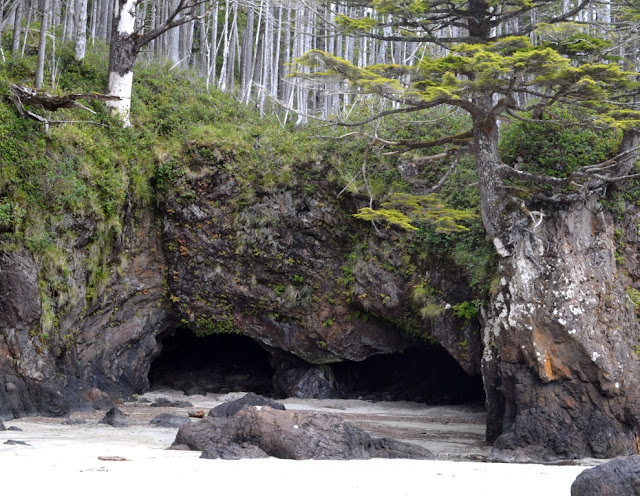On the drive we spotted this young bear munching on roadside clover, making do with a salad until the main course (salmon) arrived.
The main trail is very well maintained. We only had time to hike to the closest destination which was San Josef Bay, about 2.5 km.
After a short distance the trail splits, with the right fork leading to some of the more remote parts of the park.
This area receives a lot of rainfall, and the moisture allows the vegetation to survive well above the ground, on old logs and stumps, until eventually sending roots into the soil. Does this scenario look a bit lewd, or do I just have an overactive imagination?
Here two Western Red Cedar trees are cradling a Western Hemlock.
Dwarf Dogwood have colonized a log protruding from the ground.
A very old cedar with a backdrop of younger forest.
Some interesting mushrooms along the trail
Somehow a huckleberry bush is finding enough nutrients to survive on a limb forty feet high on this spruce tree.
We found some Labrador Tea growing in a boggy area
Are they trees or some kind of furry critters? Mountain Gorillas perhaps? Ewoks or Ents maybe?
San Josef Bay has two large sandy beaches and a bit of that outer coast feeling.
I suppose that over the eons the waves have eroded the rock away, and for some reason these pillars were left behind. Maybe they are harder rock? Maybe they'll be gone in a few more centuries. We'll have to come back and check.
It has a Japanese Garden feel to it, like natural bonsai.
There are also several cool caves that have been carved out by the sea.
In the rocky areas there were tidal pools. This one had some nice green anenomes
At the second beach there is a fresh water source which allows for camping. There were a couple of tents in the distance and a campfire burning.
On the drive back, not far from the park, we found this intriguing sign.
We walked the half mile and then, in the middle of the coastal rainforest wilderness, we found this magical botanical garden, filled with dozens of exotic trees and shrubs.
Subsequent research revealed that this land was settled by one Bernt Ronning in 1910. He was part of an early Danish settlement in the area that did not really succeed due to the harsh conditions and lack of a road connection to markets for fish and furs. Ronning, however, stayed until his death in the 1960's. He collected specimens from around the world and planted them here, eventually covering about 5 acres with his garden. There is a huge Monkey Puzzle tree which is apparently one of the oldest in BC, along with a Giant Sequoia and a host of other trees and shrubs. After years of neglect following Ronning's death, a group of volunteers resurrected, and now maintains the garden.
What a lovely surprise at the end of another awesome day on the island!
Next time - Alert Bay and more ...





















No comments:
Post a Comment